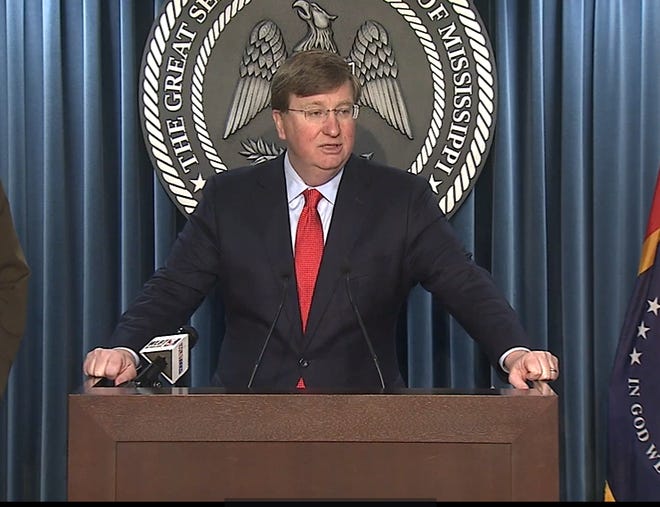Gov. Tate Reeves has signed a law authorizing a $3.5 million tax credit for individuals and businesses that donate to non-profit pregnancy resource centers in the state. These centers are typically faith-based and frequently touted as providing alternatives to abortion services.
The new law comes as Mississippi takes center stage during the upcoming Supreme Court ruling which could determine the future of abortion access in the United States. The decision centers around a 2018 Mississippi law that outlaws abortion after 15 weeks of pregnancy. The law makes exceptions for medical emergencies or “severe fetal abnormalities.”
Abortion has been legal in the United States since the landmark Roe v. Wade ruling in 1973.
Related:Mississippi’s abortion case, risk to Roe v. Wade ahead of SCOTUS decision: What we know
OPINION:Reducing unintended pregnancies will reduce abortion in Mississippi

In a press release, Reeves said that the Pregnancy Resource Act (HB 1685) is part of a larger effort to “promote a culture of life” in Mississippi and support mothers. He said that the non-profits offer free sonograms, pregnancy tests and counseling on options.
Pregnancy resource centers, also known as crisis pregnancy centers (CPCs), are often located near abortion providers and operate as nonprofit organizations aimed at dissuading people from considering abortions. The centers have faced heated criticism from medical associations and pro-choice advocates for employing misleading advertising and disseminating inaccurate health information about abortion risks and contraception.
A March 2020 study published in the National Library of Medicine identified 2,527 operating crisis pregnancy centers in the U.S. or a ratio of 3:2 per abortion facility. Both the South and the Midwest had the greatest number of CPCs, according to the study.
In Mississippi, funding from the tax credit program will be disbursed by the Choose Life program, which funds pregnancy resource centers across the state. The funding will support services at 37 centers, said Jameson Taylor, the director of research and government affairs with American Family Association Action and a senior fellow with Pro-Life Mississippi.
Taylor, who drafted the Pregnancy Resource Act, said the object of the credit “is to have more eyes, more hands, thinking about these complex problems in Mississippi. Women that are in difficult situations wondering whether to have an abortion – are going to need a multi-faceted approach to that problem. This is providing a non-profit-based approach to dealing with these complex problems.”
Mississippi is among the first states to create a tax credit for donations aimed at these centers. Missouri also has a tax credit program for CPC donations that has been around for about a decade, according to research from the Guttmacher Institute, a reproductive rights research organization.
Related:Women of color most affected if abortion is banned, limited
Report:Mississippi is one of 25 states where reproductive health and rights hang in peril
Meanwhile, advocates who support access to abortion say that resources would be better spent improving access to a range of medical services.
“There are people who never get prenatal care and just show up to the hospital and give birth. The individual is blamed and not the system,” said Laurie Bertram Roberts, the co-founder of the Mississippi Reproductive Freedom Fund. “How do you prevent unwanted pregnancies without healthcare access.”
Maria Clark is a general assignment reporter with The American South. Story ideas, tips, questions? Email her at [email protected] or follow her on Twitter @MariaPClark1. Sign up for The American South newsletter. Follow us on Instagram, Facebook and Twitter.

